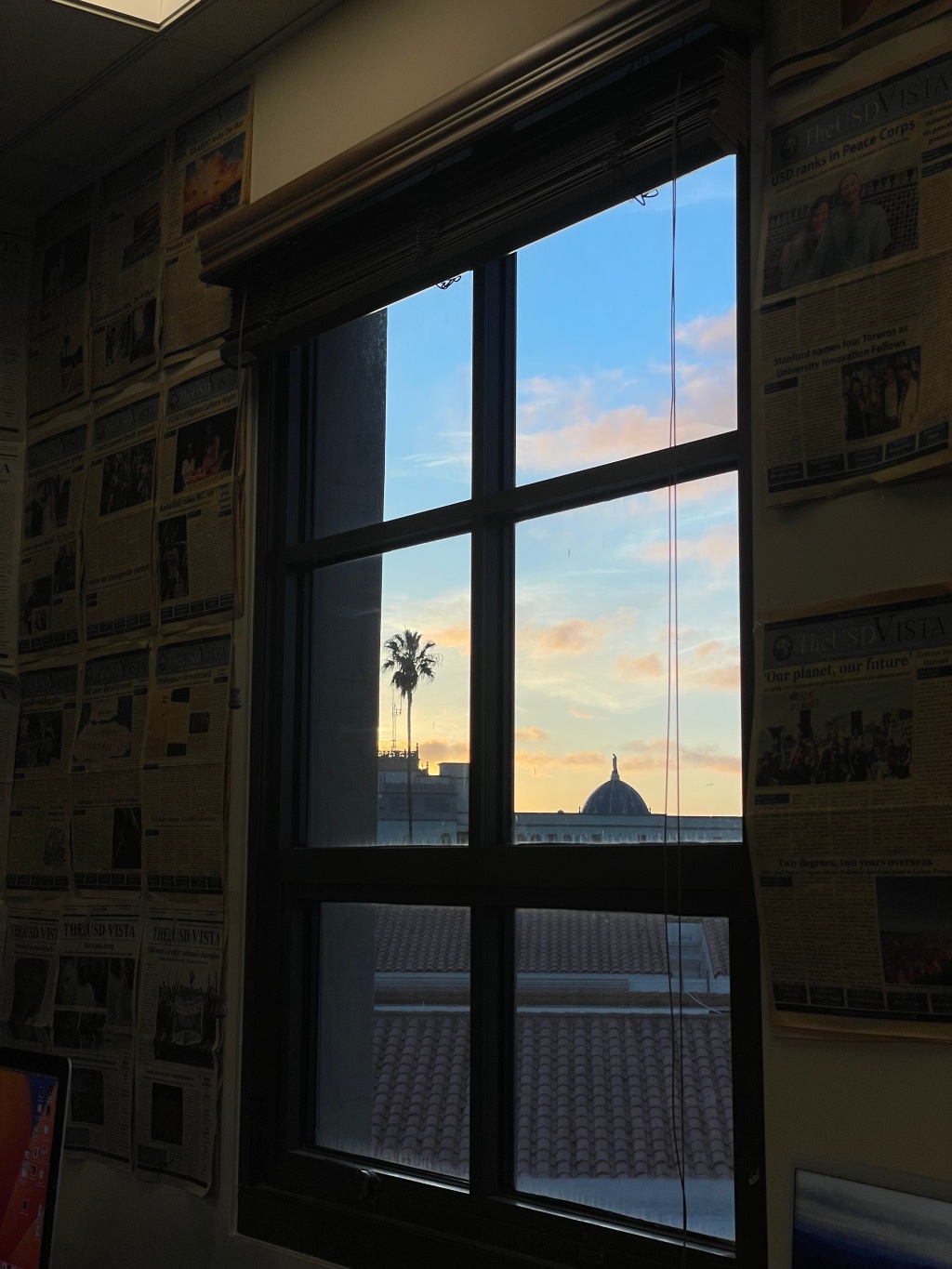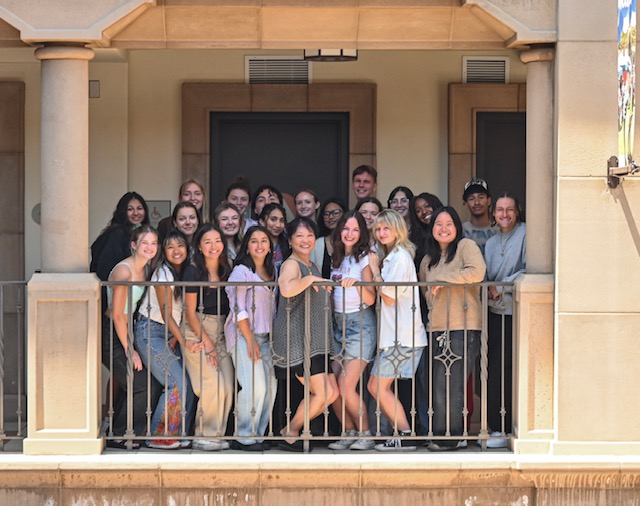Colin Mullaney / Editor-in-Chief
Anjali Dalal-Whelan / News Editor
In a letter to colleagues dated Feb. 14, faculty from the College of Arts and Sciences (CAS) at USD announced that they are organizing a union of non-tenure track (NTT) faculty, along with the Services Employees International Union (SEIU). The newly formed Organization Committee consists entirely of NTT professors: those who are contractually employed to teach courses at USD, but classified as “temporary employees” by the university.
The Organization Committee launched a website, which identifies its goals to combat, “precarious positions with low pay, little job security, no meaningful academic freedom, and few opportunities for advancement.” The website also states that, “these conditions affect student learning by limiting our ability to provide quality instruction and mentorship to our students, and they hold us back from becoming fully acknowledged and included members of the campus community.”
Theatre Department Lecturer Soroya Rowley signed the Organizing Committee’s letter, appealing to fellow CAS faculty to join their unionization effort. Rowley explained the benefits of a tenured position.
“A tenured position at a university is the ultimate dream for most academics, and it used to be the norm. Tenure ensures job security, which allows professors academic freedom in their teaching and scholarship,” Rowley stated.
Rowley also explained how the ratio of tenure to NTT positions has changed over time.“In the last several decades, tenure has been on the decline. Today, the majority of professors at most universities are non-tenure track (NTT). We teach the majority of the classes, yet we make a small fraction of the salary that a tenured professor makes, and we have no job security,” Rowley stated.
Adjunct Assistant Professor of Anthropology Meghan Donnelly was another of the Organizing Committee members who signed the letter to colleagues. Donnelly further explained the distinction between NTT and tenure faculty, and how these differences impact their lives, if their contract expires.
“Many [NTT] professors’ contracts last only one semester — [and] we may or may not be hired back. Or we may get hired again, but to teach a smaller number of courses… While there are many NTT faculty who have been teaching at USD for years — and some decades — the nature of our contracts means that we live with constant insecurity, not knowing what our income, workload, need for a second job, etc. will be the following semester, or year,” Donnelly explained.
Adjunct Assistant Professor of English, Deniz Perin-Coombs — another member of the Organizing Committee — elaborated on the instability of working in an NTT role, and how getting rehired is often outside of NTT faculty’s control.
“Most instances of NTT faculty not being hired back are related to enrollment fluctuations. NTT faculty might have classes… pulled due to low enrollment in their or others’ courses. This could also mean that they end up teaching fewer classes than anticipated, meaning less income, and possibly a demotion from benefits-based to non-benefits based,” Coombs stated.
Melissa James, Adjunct Assistant Professor of Sociology and Gender Studies, explained the goals that a union would potentially fulfill, in advocating for the workers’ rights of NTT faculty.
“Some of the core goals of unionization are for [NTT] faculty to have a real say in decisions about our working conditions, better job security and fair pay,” James said.
Their website states, “forming a union enables [NTT] faculty to negotiate collectively for better terms of employment, using democratic processes to ensure that the interests of all [NTT] faculty are represented. A union contract will establish a floor for what constitutes fair treatment and compensation, not a ceiling.”
Along with SEIU Local 721, the Organizing Committee seeks, “to ask USD Administrators to recognize our union through a card checking process,” according to their website.
SEIU Local 721 is a union that “represents over 100,000 workers in Southern California… all [NTT] faculty in the California State University system are members of SEIU, through its affiliate the California Faculty Association (CFA),” according to their website.
Rowley explained the current status of the Organizing Committee’s unionization effort.
“We are still waiting for a response from USD administrators, but we expect they will uphold USD’s vision of working for justice and leading with love by agreeing to remain neutral and respect our right to form a union under the [National Labor Relations Act].”
The National Labor Relations Act (NLRA) ensures that people who wish to form a union have the right to talk about and organize a union with their coworkers at their workplace. The law states that employers cannot threaten the jobs of employees who exercise these rights.
USD Assistant Director of Media Relations, Steven Covella provided USD’s stance toward unions on campus.
“USD is not pro- or anti- unionization. If a group of people is helped by a union, as many have been throughout history, that’s a good thing. If a union’s involvement is counter to the majority of a group of people’s best interests, it’s not. We support each person’s right to make an informed decision on whether or not to join a union based on their individual circumstances,” Covella stated.
“The Office of the Provost, faculty committees and many others at USD have been in conversation with non-tenure track faculty members over the past year to identify opportunities for enhanced job stability, compensation and advancement, and are looking forward to continuing those conversations,” Covella stated on behalf of USD.
At an Associated Student Government (ASG) meeting on Feb. 22, USD President James T. Harris III addressed the recent unionization effort by NTT faculty at CAS. He explained that tenure and non-tenure professors have different roles at USD, as tenure professors engage in research and serve on committees in addition to teaching.
“[NTT faculty] have one responsibility, and that’s teaching, and they are vitally important to the institution,” Harris said. “Anyone has the right to organize, we have no unions on campus… the last time we had a movement of this sort, what we did was we informed people what they have, what they don’t have, what they think is going on. And that group chose not to unionize, and I think that might be the case here.”
Harris also acknowledged that NTT professors face some challenges.
“I think we’ve got to do a better job with our [NTT]… we want all our employees to feel that they belong to this campus and that we are supporting them,” he said.
While the NTT professors wait for a response from USD, they have made the broader USD community aware of their unionization efforts. On Thurs Feb. 29 they are hosting a teach-in in the Learning Commons from 12:30-2 p.m. which is open for all students, faculty and staff to learn more about the union.
Non-tenure track professors in the College of Arts and Sciences have begun the process of unionizing. Photo courtesy of Meghan Donnelly





Leave a comment